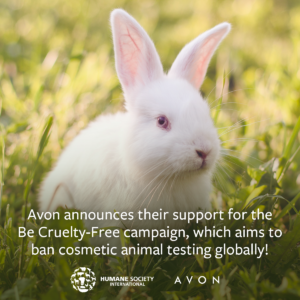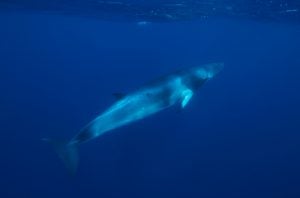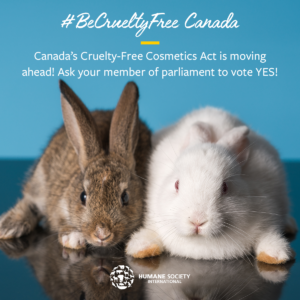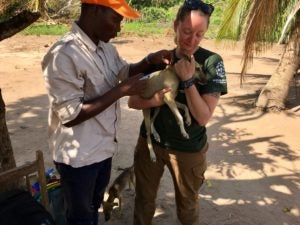
LONDON—Avon Products, Inc. (NYSE: AVP), today announces its support for a worldwide ban on animal testing for cosmetics by backing Humane Society International on its #BeCrueltyFree initiative. The campaign is leading legislative reform to prohibit cosmetics testing on animals in all major global beauty markets by 2023.
Avon has committed to support #BeCrueltyFree to drive regulatory change in key markets around the world – predominantly in Latin America and Southeast Asia – towards the desired global ban. Avon will also support the recently launched Non-Animal Cosmetic Safety Assessment Collaboration (NACSA). NACSA aims to promote best practice in animal-free safety assessment among companies and government health authorities to promote faster acceptance and use of modern non-animal approaches, particularly in countries such as China, where cosmetic animal testing is still required by law for some products. By throwing its weight behind Humane Society International and joining its ever-growing network of supportive beauty giants, Avon believes an end to the era of cosmetic animal testing will be achieved more swiftly.
Avon was the first major cosmetics company to end animal testing 30 years ago and has decades of experience in developing non-animal approaches to product safety evaluation. It collaborates with partners across the world, including advocacy organizations and NGOs to accelerate the adoption of non-animal-test methods.
Louise Scott, Chief Scientific Officer at Avon, said: “Avon’s been working to end animal testing for 30 years, but as an industry there is still more to do. I’m proud of our contribution to driving change to date. But we’re even stronger if we work with others. It’s crucial that we open up more partnerships with other change-agents to end the unnecessary and unacceptable practice of animal testing for cosmetics.
“We’re confident that through collaborations with HSI and other committed partners we will accelerate the transition to alternative approaches to animal testing and result in a worldwide ban in the foreseeable future. It’s a future that we at Avon are committed to and that millions of Avon Representatives and their customers around the world demand.”
As part of Avon’s support for HSI’s campaign, it will continue to actively collaborate with global partners to accelerate the adoption of a worldwide ban on animal testing. The new multi-year collaboration between Avon and HSI will include Avon’s support for robust legislation to prohibit cosmetic animal testing in key global beauty markets and participation alongside other leading brands to enhance capability across companies and regulatory authorities so safety decisions for cosmetics are based on exclusively non-animal approaches.
HSI Vice President for Research & Toxicology Troy Seidle said: “We couldn’t be more pleased to welcome Avon to our #BeCrueltyFree campaign family. As a household name in so many of our priority campaign regions thanks to its direct-to-consumer marketing model, Avon’s reach will provide a significant boost to our efforts to abolish cosmetic cruelty across the globe. Other socially conscious beauty brands are encouraged to join Humane Society International in supporting meaningful legislative change to usher in a new era of ethical beauty worldwide.”
For images, visit the newsroom.
-ENDS-
Media contacts:
Avon
HSI
- London: Wendy Higgins, +44 (0)7989 972 423, whiggins@hsi.org
- Washington, DC: Nancy Hwa, 202-596-0808, nhwa@hsi.org
About Avon Products Inc.
For 130 years Avon has stood for women: providing innovative, quality beauty products which are primarily sold to women, through women. Millions of independent sales Representatives across the world sell iconic Avon brands such as Avon Color and ANEW through their social networks, building their own beauty businesses on a full- or part-time basis. Avon supports women’s empowerment, entrepreneurship and well-being and has donated over $1billion to women’s causes through Avon and the Avon Foundation. Learn more about Avon and its products at www.avonworldwide.com. #Stand4Her
About Humane Society International
Humane Society International and its partner organizations together constitute one of the world’s largest animal protection organizations. For more than 25 years, HSI has been working for the protection of all animals through the use of science, advocacy, education and hands on programs. Celebrating animals and confronting cruelty worldwide – on the Web at hsi.org.
Forward-Looking Statements
This material contains “forward-looking statements” that are made pursuant to the safe harbor provisions of the Private Securities Litigation Reform Act of 1995, including statements relating to Avon’s involvement with the Humane Society International. Because forward-looking statements inherently involve risks and uncertainties, actual future results may differ materially from those expressed or implied by such forward-looking statements. These risks and uncertainties include, but are not limited to, the possibility of business disruption, competitive uncertainties, and general economic and business conditions in Avon’s markets as well as the other risks detailed in Avon’s filings with the Securities and Exchange Commission. Avon undertakes no obligation to update any statements in this material after it is posted to the Investor Relations section of our website.



